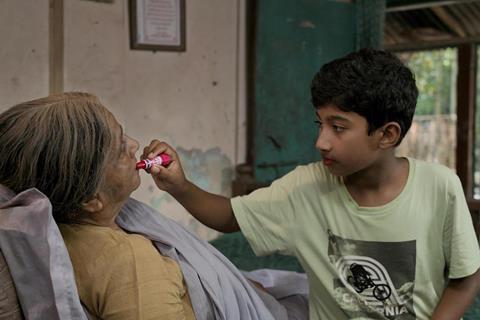A young Bangladeshi boy struggles to connect with his largely absent father – and his true self – in this coming-of-age drama

Dir: Biplob Sarkar. Bangladesh. 2023. 80mins
Bangladeshi filmmaker Biplob Sarkar’s debut feature The Stranger is a coming-of-age drama about a young boy grappling with his gender identity amid the changing contours of the parent-child relationship within a dysfunctional family. Sarkar tells it with conviction, with his filmmaking sensibility quite evidently rooted in the realism that marked the Indian New Wave or the parallel cinema movement of the 1950s and ’60s.
There is a frugality to the frames and the narrative is austere, but it brims over with humanity
Supported by the National Film Grant of Bangladesh, The Stranger was one of the projects in the Film Bazaar Recommends section of the NFDC Film Bazaar in Goa last year, where it won the Prasad Lab DI award. It has its world premiere at the Busan International Film Festival in the competitive New Currents segment, dedicated to first and second films. Its confidence of context, authenticity, and a thread of compassion running throughout could see it connect on the international festival circuit, although at home a small-screen platform seems a more likely destination.
Set in rural Bangladesh, The Stranger is centred on young Kajal (Ehan Rashid), giving us vignettes of his life in the village between home, attending school and playing outdoors with friends—identifying the different types of snakes by the skin they have shed in the forest and the fields, climbing trees to look for eggs in the bird nests. He lives with his ailing grandmother (Ferdausi Majumdar) and mother Kohinoor (Sahana Rahman Sumi) who works as seamstress to somehow make ends meet. His father Javed (Raton Kumar Deb), an itinerant soul, stays away from home for long stretches and then suddenly drops by unannounced, setting the village abuzz with rumours of his presumed second marriage and the consequent division of his time between the two families.
The title of the film points at the alienation in this small family of four. But Sarkar does not hammer home the point, showing it subtly through little throwaway details. Kohinoor might start making herself more attractive on Javed’s return, but he seems to have become an outsider to her. The couple might share the same bed but cannot bridge the growing distance—physical and emotional—between them. Then there is the near oedipal resentment on Kajal’s face when he is forced to sleep in his grandmother’s room when Javed usurps his usual spot next to his mother. His father is like an unwanted intruder, or an uninvited guest who has crashed the party.
These individuals are strangers to their own inner selves, too. Kajal is unable to conform to the expectations of the world and gives vent to his angst and anxiety through the sketches in which he documents everything—including the very real overtures of predatory senior Jewel (Hridoy Hossain). Or the desire to take his mother somewhere far away, to have her just for himself.
These situations are fraught with conflict, but Sarkar eschews drama or sentimentality. He keeps the story simple and straightforward, and emotions understated; he lays bare the family dynamics with empathy. The film moves at an unhurried, gentle pace, in tune with the daily rhythms of the rural life it is rooted in. The actors—their presence and faces—make the emotions tactile, particularly the stoicism of Sahana Rahman Sumi that hides a raging storm within and the effortlessness of the doe-eyed Ehan Rashid, a natural.
There is a frugality to the frames and the narrative is austere, but it brims over with humanity. The film makes its point quietly, relying on the power of the implicit that hits home particularly strongly in the pivotal scene where lipstick, bindi and the art of makeup bring the walls crashing down and help forge the crucial missing link between father and son. In their exchange of smiles lies an unspoken realisation of a shared fate.
Production company: Moyo Kino
Contact: biplobsarkarp@gmail.com
Producer: Tazul Haque, Biplob Sarkar
Screenplay: Biplob Satkar
Cinematography: Mazaharul Razu
Production design: Wakilur Rahman, Saddam Khandaher Joy
Editing: Sankha, Biplob Sarkar
Main cast: Ferdausi Majumdar, Sahana Rahman Sumi, Raton Kumar Deb, Ehan Rashid, Hridoy Hossain
























